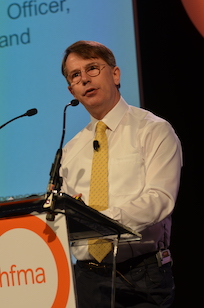News / Baumann asks four questions of finance leaders (HFMA 2016)
Moving on to risk, he referred to the recent HFMA NHS financial temperature check's suggestion that sustainability and transformation plan (STP) areas' risk management processes were not yet adequate. He said this was ‘understandable, given their short gestation period’, but it could not continue. Finance staff had to adapt and ‘use our core skills of identifying and mitigating risk, rather than putting up barriers to progress  ’.
’.
On the issue of collaborative working, he said STPs were the best ways to strengthen relationships. This would start with the current contracting process and organisations would have to ‘act quickly’ to build on the improving relationships, set in train by the STP process and closer collaboration under the two-year operational plan.
His fourth question related to the capability and leadership of the finance function, which had to ensure it has the confidence and support to deliver the transformational changes needed over the coming years. ‘In this, Future-Focused Finance is a programme whose time has truly come,’ he said.
FFF had a number of programmes that would help answer his four questions. For example, the Best possible value workstream included a toolkit to help standardise processes, while a systems maturity toolkit would be launched soon to allow finance departments to benchmark against their peers.
While risk management had not been a particular focus for FFF to date, he strongly endorsed the integrated support and assurance process.
Partnership working would mean building on the traditional finance network and also engaging with clinical colleagues. This was the focus of the Close partnering workstream. There were around 200 finance and clinical educators. ‘They will build a mutual knowledge and professional understanding through a common language,’ he said.
He said the capability and leadership of the finance function would be boosted by a reduction in the reliance on interim finance directors. He welcomed the moves on NHS leadership, which includes an expansion of graduate finance training, and the new HFMA qualification scheme.
He also announced the launch of a national talent pool, which will produce a pipeline of finance staff ready to take on director level posts. Around 50 candidates will be recruited towards the end of January, he said. FFF would also be launching an accreditation scheme for finance departments.
Looking at the NHS in England financial position in 2016/17, he said that, taking the commissioner and provider sector together, there was the potential for a small underspend at year-end. However, there was little room to mitigate against potential risks, ‘including technicalities such as provision accounting that can trip us up at the last minute’.
He acknowledged it would be tough but it was essential to deliver a balanced position, as this would provide a launching pad for STPs in 2017/18. ‘We are totally committed to supporting you to get there in the coming critical months,’ he added.
Related content
We are excited to bring you a fun packed Eastern Branch Conference in 2025 over three days.
This event is for those that will benefit from an overview of costing in the NHS or those new to costing and will cover why we cost and the processes.